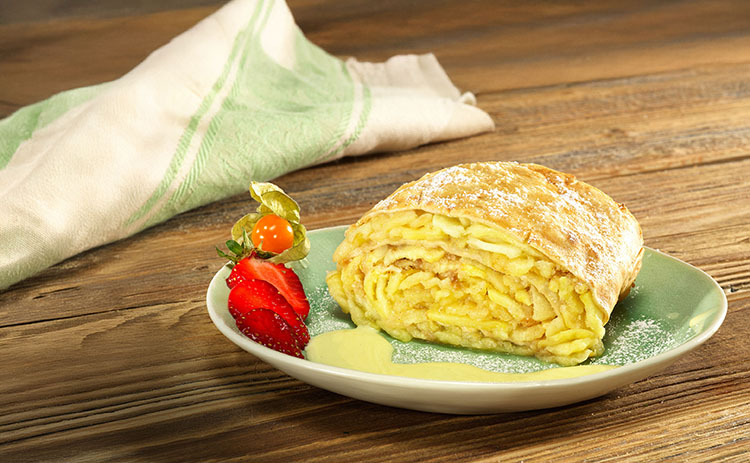
Dinghartinger Apfelstrudel Produktions und Vertriebs GmbH supplies wholesalers with frozen strudel and other pastries. Strudel is a highly competitive market, a niche in which the company has successfully established itself, with plans for new construction.
By Helga Baumfalk
Dinghartinger produces 60 different types of strudel, both sweet and savory, some of which are organic or gluten-free, at its headquarters in Landsham, about 20 km east of Munich. “Strudel is our core competence,” emphasizes Julia Landauer, who has power of attorney in the company, heads quality assurance, and will succeed her father, Walter Landauer, as managing director in the near future. The company in Landsham also produces Kaiserschmarrn, apple fritters, Ausgezogene, and onion tart. A small part of the range ispurchased in to round it off, such as gluten-free breads.
Not everyone can do that
There is a certain art to making a good strudel. Not everyone can do it. “Appearance, taste, a ‘homemade quality’, lots of filling, little dough – that’s what matters,” says the authorized signatory. “We place great importance on the selection of our raw materials, including the apples for our apple strudel.” Dinghartinger has been working with the same fruit supplier for years, sourcing its apples mainly from the Lake Constance region, sometimes from Styria. And very importantly: “We peel our apples ourselves.” The company processes up to 3,000 tons of apples per year. This is quite labor-intensive, says Landauer, but crucial for the quality of the end product. “Of course, we could buy frozen apple slices, but then our apple strudel would lose its fresh, ‘homemade’ character. And that’s exactly what we don’t want.”
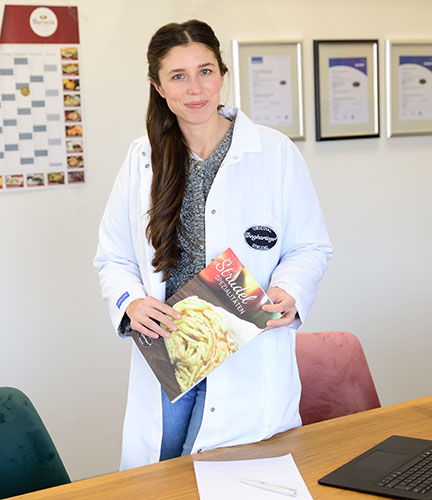
“Appearance, taste, a ‘homemade quality’, lots of filling, little dough – that’s what matters when it comes to strudel.”
Julia Landauer
“Then we’ll just make strudel.”
It all started exactly 40 years ago with apple strudels. “My parents ran a guesthouse in Grossdingharting – hence the name – and baked apple strudel that was so popular that my father started supplying frozen strudel to restaurants in the surrounding area,” says Landauer. “When the lease was not renewed, my parents decided: ‘Then we’ll just make strudel.’ At first, they were ridiculed because the frozen apple strudel they produced in their first bakery, made from strudel dough, pre-cut into 160-gram portions, did not exist at the time. Now it’s the standard.” This very product is still Dinghartinger’s bestseller today. Only the rolling out of the strudel dough, which Heidemarie Landauer did by hand when she started, is now done with FRITSCH dough sheeting machines.
The quantities of strudel and other pastries that Dinghartinger delivers would be impossible to manage without automation. “Nevertheless, we will never be a fully automated operation,” the junior manager is certain, “because we stand for products with a homemade character.”
PASTRY LINE
What matters in strudel production
Dinghartinger produces all its strudels on a line from FRITSCH. We asked the machine manufacturer what is important in dough processing for this specialty range.
The most important thing in the production and processing of strudel dough is to roll it out evenly and thinly – regardless of whether it is classic strudel dough or puff pastry dough. With puff pastry, it is essential that the laminated layers of fat are not damaged. Whether rolled or folded, there are many processing options where FRITSCH machines can be used flexibly. One example of this is the VARIOFLEX M 700. Thanks to its compact dimensions, this flexible pastry line is ideal for small and medium-sized artisan bakeries.
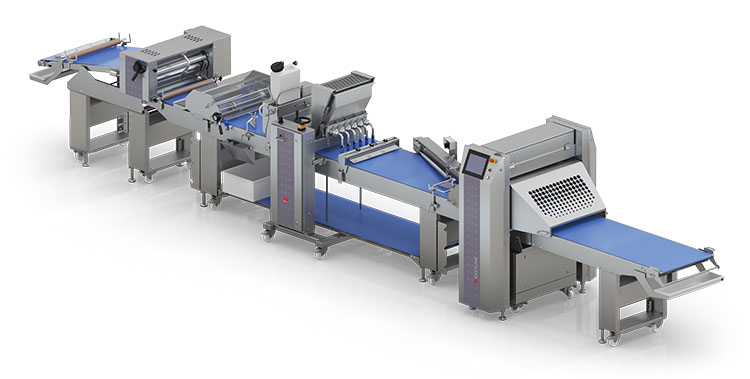
FRITSCH VARIOFLEX M 700 pastry line
Country-specific expectations
Sales are conducted through wholesalers, primarily to restaurants, caterers for daycare centers and school cafeterias, hospitals, company cafeterias, kiosks, and bakeries. The core market is Germany. “All of Germany,” Julia Landauer interjects. “Everyone knows strudel, even in the north.” Exports go to Austria, Switzerland via a partner, the Baltic countries, the Netherlands, and Costa Rica. “We are currently also putting out feelers in the Arab world,” she says, mentioning country-specific characteristics: “While the classic rolled strudel is in demand in Germany, in Austria, they expect the filling to contain no dough. Here we offer a ‘Hülle/Fülle-Strudel’ (wrapping/filling strudel), i.e., the filling is only wrapped in dough.”
“Convenience has grown in popularity over the years, certainly also as a result of the shortage of skilled workers. High-quality convenience is particularly in demand.”
Julia Landauer
Not through food retailers
As things stand today, food retailers are not an option as a sales channel. “We’re sticking with wholesale.” Landauer explains: “If a restaurant guest notices that one or more products are the same as those available in stores… we don’t want to get into that conflict in the first place. The same applies to frozen foods. We have no plans to enter the fresh food sector.”
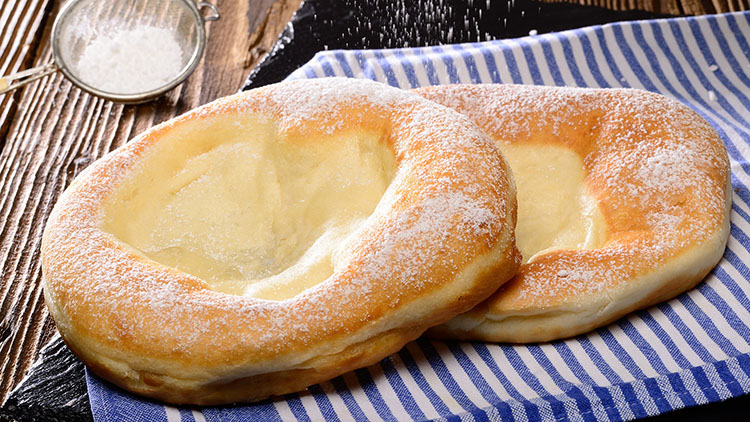
Ausgezogene are boiled yeast pastries that can be eaten sweet with cinnamon sugar or savory, e.g., with sauerkraut. To make them, the dough pieces are rolled into balls and then shaped by hand. Ausgezogene are particularly well known in southern Germany and Austria
Convenience is changing
The quality of and attitude toward convenience have changed. Today, even top restaurateurs openly admit to using convenience products. Dinghartinger has noticed this development. Julia Landauer: “Convenience has grown in popularity over the years, certainly also as a result of the shortage of skilled workers. High-quality convenience is particularly in demand.”
To meet different needs, Dinghartinger offers strudels in various degrees of convenience: baked and pre-portioned, or as dough sticks for baking. “Many restaurateurs want to bake themselves, while company canteens often lack the time or equipment to do so.”
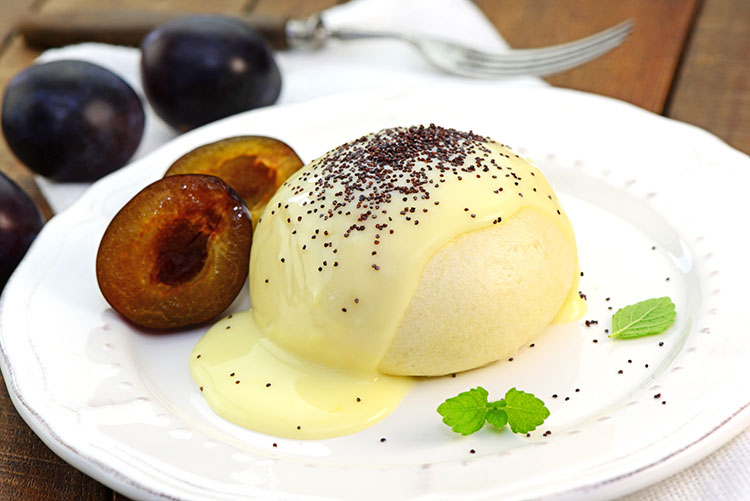
Germknödel, like Dampfnudeln, Kaiserschmarrn, and Zwiebelkuchen, are classic dishes in seasonal cuisine. This is reflected in sales during the winter season and Oktoberfest
Savory options are catching up
Classic sweet strudels are the main products in the range. “But savory options are catching up,” reports the junior manager, “especially when they cater to the trend toward healthy or vegan diets.” The vegetable strudel is one of them; it is now one of the top seven products in the range and is also served as a main course in cafeterias in 250 g portions. Dinghartinger is creative. The savory strudel range also includes red cabbage and sauerkraut strudel, for example, and sweet potato strudel almost made it into the range.
“We can make strudel out of almost anything.”
Investment in the future: New building in Landsham
Work on the new building at the headquarters in Landsham has been underway since March 2025. In the first phase of construction, a fully automated high-bay warehouse with almost 2,300 storage spaces and expansion options for an additional 800 storage spaces is being built on a total area of around 7,000 square meters. In addition, a new delivery area for shipping goods, production and packaging areas, and social rooms (including a prayer room and training rooms) for staff are planned. The production of apple fritters and Kaiserschmarrn will be relocated to the new building, while the two strudel lines will remain in the existing building. This is the company’s largest investment in the past 40 years. Commissioning is planned for March 2026.
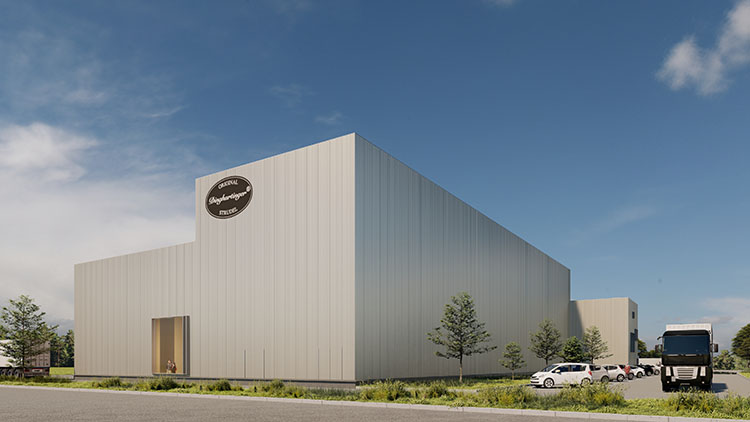
Because the customer structure is changing
Speaking of vegan, this is also an issue with apple strudel. “We replaced the egg in the classic strudel dough so that we could offer it as a vegan option.” That was a good move, says Landauer. “The dough is now smoother, and we were able to improve our carbon footprint.” Sustainability is important, she says. “You can always find ways to become more sustainable in your own company. For example, we have installed a heat recovery system to cover our hot water needs. We prefer to buy raw materials such as quark, apples, and potatoes regionally. The apple peelings go to the biogas plant.” Dinghartinger does not produce kosher products – not yet. But that is changing, “because the customer structure is changing. Many consumers today have an ethnic background, and we are targeting the Arab region as a new market.”
Another big seller: Kaiserschmarrn
Alongside strudel, Kaiserschmarrn (a lightly sweetened, shredded pancake named after Austrian emperor Franz Joseph, who famously liked the dessert) is a big seller in the range and competes with ready-baked apple strudel. “Demand is increasing from month to month,” observes Julia Landauer. “Kaiserschmarrn is a huge topic on the market. The product is just as popular in communal catering as it is in food service, especially in ski cabins, of course.” Once again, there are big differences in quality on the market. “The egg content is crucial, as is cutting the pastries correctly. It mustn’t look artificial.” Dinghartinger now produces Kaiserschmarrn in three shifts, five days a week. Nevertheless, capacity is still not sufficient to meet demand. This is one of the reasons why the company is building in Landsham.
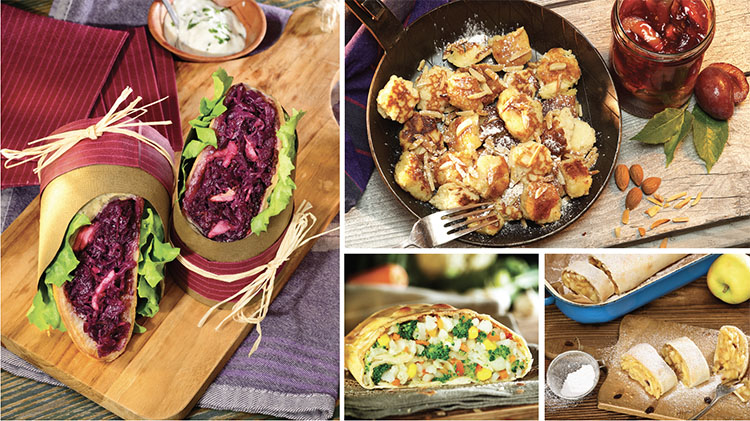
A good job
Dinghartinger is a family business and will remain so after the takeover by Julia Landauer. She emphasizes: “I’m not ‘the daughter of,’ I can do it. I’ve worked hard for my position. I see the takeover as a great opportunity that was handed to me on a silver platter. I’m aware of that and will honor the company. I think we’re doing a good job.” And Dinghartinger’s balance sheet figures reflect it.
About Dinghartinger:
+ Founded in 1985 by Walter Landauer (sales) and Heidemarie Landauer (production)
+ Started with a restaurant in Grossdingharting, later focused on frozen strudel production and distribution to the catering industry
+ Growth with the introduction of ready-baked frozen apple strudel in 160 g portions
+ 2001: Production expands and the company headquarters relocate from Parsdorf to Landsham
+ Today: Around 60 employees
+ Sales to wholesalers only
+ The product range includes 60 types of strudel, Kaiserschmarrn, Dampfnudeln, frozen stollen, gluten-free bread and pastries, as well as onion tart and strudel and puff pastry for home filling
+ Products are offered unbaked or ready-baked and portioned
+ New line for Ausgezogene launched in 2022
+ 2025: a new construction project starts


